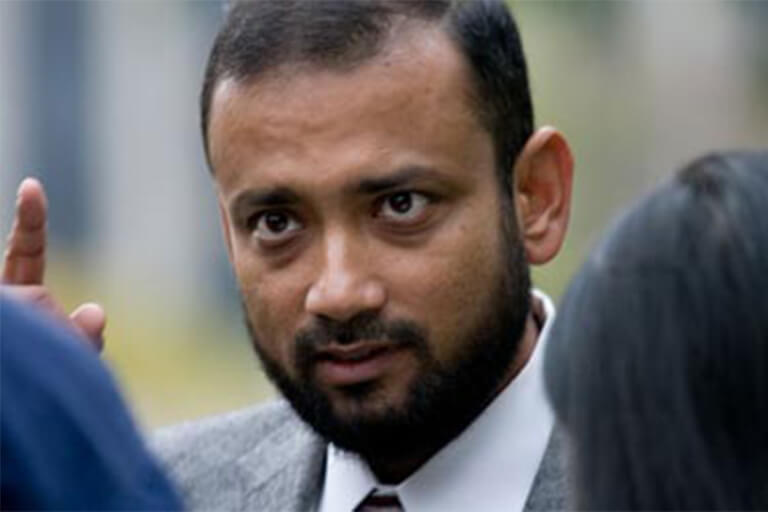Muslim Voices — Faiz Rahman Commentary

Audio transcript:
0:00:05:>>MANAF BASHIR: Welcome to MUSLIM VOICES. I'm your host Manaf Bashir.
0:00:09:(SOUNDBITE OF MUSIC)
0:00:11:>>MANAF BASHIR: Our series is designed to engage people in conversation about issues in the Muslim world, also to help them better understand the lives of Muslims. That's the goal of commentator Faiz Rahman as well. The Indiana University professor has spent chunks of time doing outreach in local communities in an attempt to bridge the cultural divide between Muslims and non-Muslims. On September 11, 2001, Rahman saw just how important bridging that divide was when a student in one of his classes said all foreigners should be kicked out of the United States. As he explains in this commentary, it was a comment that made him fear for the safety of his family.
0:00:47:>>FAIZ RAHMAN: As an immigrant family, we tried to put ourselves in other people's shoes. We knew we were different and that some people might feel uneasy with our color, accent, or my wife's long dresses and her Islamic headscarf. So I called my wife and asked how everything was - if our two boys, at that time age 4 and 2, were OK - if anyone called or knocked on the door. She said the kids were OK and there were knocks on the door and also phone calls. I felt a cold snap passing through my spine. Who are they? She come to say our neighbors. Which ones? Did they say anything? Did they leave any message? I almost screamed. Yes, she said. One knocked on the door. I was scared and didn't respond. But then that neighbor called from her home and left a message saying they are worried about us. She said we can stay with them tonight if we feel scared or vulnerable. Two others also left messages that said similar things. My wife couldn't finish her sentence, her voice almost choked with emotion. Wow, I was amazed. I was not ready for this. I thought the knocks and calls came from people who wanted to kick us out, not to invite us to stay with them if we are scared.
0:02:16:(SOUNDBITE OF MUSIC)
0:02:16:>>FAIZ RAHMAN: Well seven years have passed since that fateful morning of 9/11. Many things have changed, you know, in this country since then. Some for the better, some for the worst. But for Muslims in America, it continues to be a roller coaster ride. Within a few days of the terrorist attack, thousands of Muslims had been rounded up by the federal authorities in an effort to identify potential terrorists. Many have been imprisoned for months and years, others deported, but none has been convicted of any crime. At the same time, many sympathetic Americans across the country have taken the extra step of visiting mosques, participating in interfaith dialogues, and making new Muslim friends. But unfortunately, ignorance still persists and the occurrences of hate crimes against Muslims have gone up in recent years. On the upside, the Muslims in recent years have been elated at the election of the first ever Muslim to the U.S. Congress and even more elated at the election of the second one. These events have somehow assured them that they still have a place in their own country and that the good old American virtues of fairness and justice will finally triumph over the ugly human vices of stereotype and prejudice. Although the false rumors in recent months about the Democratic presidential nominee being a secret Muslim and the fact that it is considered a negative by some raises doubts again in the minds of many American Muslims. Can a Muslim then ever truly be considered an American like any other? Well, if my neighbors' actions on 9/11 are any indication, then the answer has to be yes. it's just going to take honest dialogue, a lot of understanding, and time.
0:04:08:(SOUNDBITE OF MUSIC)
0:04:11:>>MANAF BASHIR: Faiz Rahman is an associate professor of geography at Indiana University. He also serves as the president of the Islamic Center of Bloomington.
0:04:19:(SOUNDBITE OF MUSIC)
0:04:21:>>MANAF BASHIR: This has been MUSLIM VOICES, a production of the Voices and Visions Project in partnership with WFIU Public Media from Indiana University. I'm Manaf Bashir. Support for Muslim voices comes from the Social Science Research Council. You can subscribe to our podcast on iTunes or join the discussion on our website. Find us online at muslimvoices.org.


 IU Global
IU Global